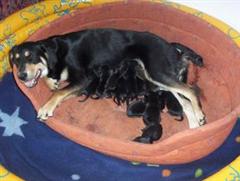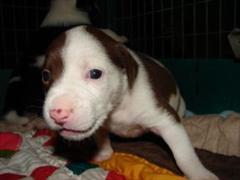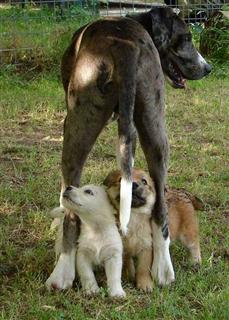Pregnancy Care
Veterinary & Aquatic Services Department, Drs. Foster & Smith, Inc.
Pregnancy in the dog lasts approximately 63 days. Just because a bitch was bred, however, does not necessarily mean she has become pregnant.
Determining if a bitch is pregnant
For the first three weeks or so of pregnancy, you may not notice any changes in the bitch. Some females will become more demanding for attention, their nipples may enlarge slightly, and some may become hungrier. These are not a guarantee of a pregnancy, but are good signs. Bitches can show the same signs during 'false pregnancy,' a hormonal abnormality, which may occur after a bitch has been in heat.
Several methods are available to determine pregnancy. A clear mucoid vaginal discharge may be seen. It is a reasonably reliable sign of pregnancy and is noticed about 4-5 weeks into pregnancy and continues until parturition.
Ultrasound is able to pick up fetal heartbeats at about 28 days into gestation.
This will not be able to determine the number of puppies but can give an estimate and can confirm a pregnancy. At about the same time, a veterinarian may be able to palpate the uterus and feel the fetuses. |
 |
This may not be possible on a large dog or one that has the puppies under the rib cage. A blood test to check for pregnancy is available. It checks for the hormone, relaxin, which is produced when the fertilized egg implants. The test can be done about 28-30 days into the pregnancy. Small litter sizes (less than 3 puppies) may result in a false negative result. X-rays can be taken around the 60th day of pregnancy to confirm a pregnancy, count the number of fetuses, and determine size-wise if the puppies will fit through the birth canal.
Care of the pregnant bitch
The bitch should continue to have regular, but not strenuous, exercise to help her maintain her muscle tone and not become overweight. If feeding a high quality, premium dog food, a vitamin/minerla supplement is probably not necessary. The premium dog foods today are very good at supplying all the dog needs - that was not necessarily true in the past. Do not oversupplement, as that may be harmful to the developing puppies. Some breeders will add cottage cheese or a cooked egg to the diet on alternate days for extra protein.
This is not necessary if a premium dog food is fed but can be done if desired.
If you are adding supplements to the diet, get a list of all the ingredients and nutritional labels and take everything to your veterinarian to make sure it is still balanced. Oversupplementing with calcium during pregnancy predisposes the bitch to eclampsia.
English Setter eatingShe should have been on a premium adult food prior to pregnancy and for the first few weeks of pregnancy. |
 |
Starting the fourth or fifth week of pregnancy, begin adding a premium performance food or premium puppy food (do NOT use large breed puppy formulas, which are generally lower in protein, fat, and minerals) to her diet.
Each week increase the amount of the performance or puppy food and decrease the amount of adult food, so when she is in her final week of pregnancy, she is on all performance/puppy food. Increase the frequency of the daily meals to three by mid pregnancy. She may need to eat small meals every 3-4 hours during the last week of the pregnancy as the puppies continue to take up more room. Remember, most fetal growth occurs in the last two weeks of gestation.
During the last week of pregnancy and the first 3-4 weeks of lactating, she may eat 2-4 times the amount she ate before pregnancy. As long as she is gaining a healthy amount of weight and not becoming obese, she should receive the food. The goal should be to have the bitch weigh the same at weaning as she weighed at breeding providing that this was an ideal weight for her.
If she has external parasites such as fleas or ear mites or internal parasites such as roundworms, discuss treatment options with your veterinarian. It is usually better to treat the mother before the puppies become exposed after birth.
With a few exceptions, (Drugs to Avoid in Pregnant and Nursing Dogs) one should avoid using all medications in pregnant and lactating (nursing) dogs. There may be instances in which a medication not recommended for use during pregnancy may need to be used to save the life of the bitch, even though it may potentially harm the fetuses. Always consult with your veterinarian before administering any drug or supplement to a pregnant or nursing dog.
Determining the whelping date
Length of pregnancy, as mentioned, is normally about 63 days from ovulation, which may be different than the date(s) of breeding(s). The timing of ovulation and the whelping date can be determined using progesterone and/or luteinizing hormone (LH) testing.
The whelping date can also be based on when the bitch first enters diestrus. If vaginal smears are done during proestrus, estrus, and into diestrus, an accurate predictor of whelping is 57 days after the first day of diestrus plus or minus 1 day.
Pregnant Golden RetrieverAt least two weeks before she is due to whelp, a whelping box should be set up so she can become accustomed to it. If you wait too long, she may have them in the closet, on your bed, or in the basement.
Toward the end of pregnancy or on the day the puppies are delivered, set up an appointment for dewclaw removal and tail docking with your veterinarian, if appropriate. These procedures are usually done at 2-3 days of age. Check with the show regulations before doing these procedures, as some breeds require that dewclaws remain intact for showing.
References and Further Reading
Pet Education
Cain, J; Lawler, D. Small Animal Reproduction and Pediatrics. Pro-Visions Pet Specialty Enterprises. St. Louis, MO; 1991.
Ettinger, SF. Textbook of Veterinary Internal Medicine, 3rd ed. W.B. Saunders Company. Philadelphia, PA; 1989.
Evans, JM; White, K. Book of the Bitch. Howell Book House. New York, NY; 1997.
Feldman, E; Nelson, R. Canine and Feline Endocrinology and Reproduction. W.B. Saunders Company. Philadelphia, PA; 1987.
Finder Harris, B. Breeding a Litter: The Complete Book of Prenatal and Postnatal Care. Howell Book House. New York, NY; 1993.
Holst, P. Canine Reproduction: A Breeder's Guide. Alpine Publications. Loveland, CO; 1985.
Lee, M. Whelping and Rearing of Puppies. T.F.H. Publications, Inc. Neptune City, NJ.
|




